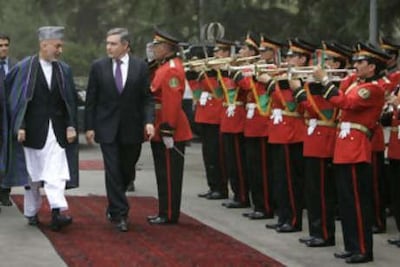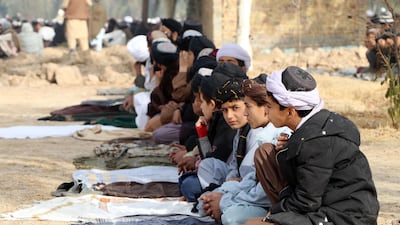Failing to halt a starvation crisis in Afghanistan would come back to haunt Western societies and the country's former financial backers, former UK prime minister Gordon Brown has said.
Mr Brown, now a UN envoy for education, said 23 million people would not be able to feed themselves this winter, adding to Afghanistan’s woes after the Taliban took power in August.
Although the Taliban regime is unrecognised and some assets frozen abroad, Mr Brown said vital funds could reach the Afghan people via aid groups and organisations such as Unicef and the World Food Programme.
He said Britain should be leading an international donor conference that would need to raise about $4.5 billion in aid for the Afghan people.
“We’ve got to act for moral reasons, but also it’s in our self-interest to do so,” he told BBC Radio 4’s Today programme on Wednesday.
“Otherwise, we will see mass emigration from Afghanistan, and at the same time we will see resentments building up.”
Terrorists could exploit this by “telling young people in Afghanistan that co-existence with the West is impossible,” said Mr Brown, who oversaw the British presence in Afghanistan from 2007 to 2010.
“We’ve got to do something to help particularly those who face starvation. Otherwise, not just for moral reasons but for self-interested reasons, this will come back to haunt us.”
As well as food shortages, Afghans face problems getting fuel, electricity and health treatment, according to UN experts. There are particular fears for women, after the Taliban imposed a series of restrictive measures.

Mr Brown said a UN-backed group called Education Cannot Wait was arranging informal teaching for girls banned from schools under the Taliban.
“There are many things that we can do, bypassing the Taliban regime and not giving succour to them, and not allowing them to get any credit for doing what is necessary to do for humanitarian reasons,” he said.
“We can get money into Afghanistan to enable people to be properly fed in the first instance, and then to have a proper healthcare system.”
He said the suggested figure of $4.5bn in aid should be seen as a small amount compared to the billions poured into a 20-year war that ultimately failed to keep the Taliban out of power.
The militants seized control in August in a chaotic sequence of events that led to thousands of people being airlifted out of Kabul’s international airport.
Although the defeat of the US-led coalition showed the shortcomings of western nation-building, it did not remove the fact that everyone is affected by decisions made in Afghanistan, said Mr Brown.
Western governments have said any co-operation for the Taliban will hinge on whether they respect human rights, allow safe passage out of the country and prevent terrorists from using a fragile Afghanistan as a safe haven.
Mindful of a potential migration wave, European countries have sought to work with Afghanistan’s neighbours to stop large numbers fleeing the region.
Nonetheless, Afghans recently became the largest group of asylum seekers in the EU, overtaking Syrians for the first time on record.


